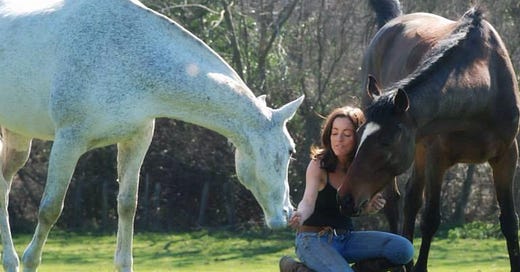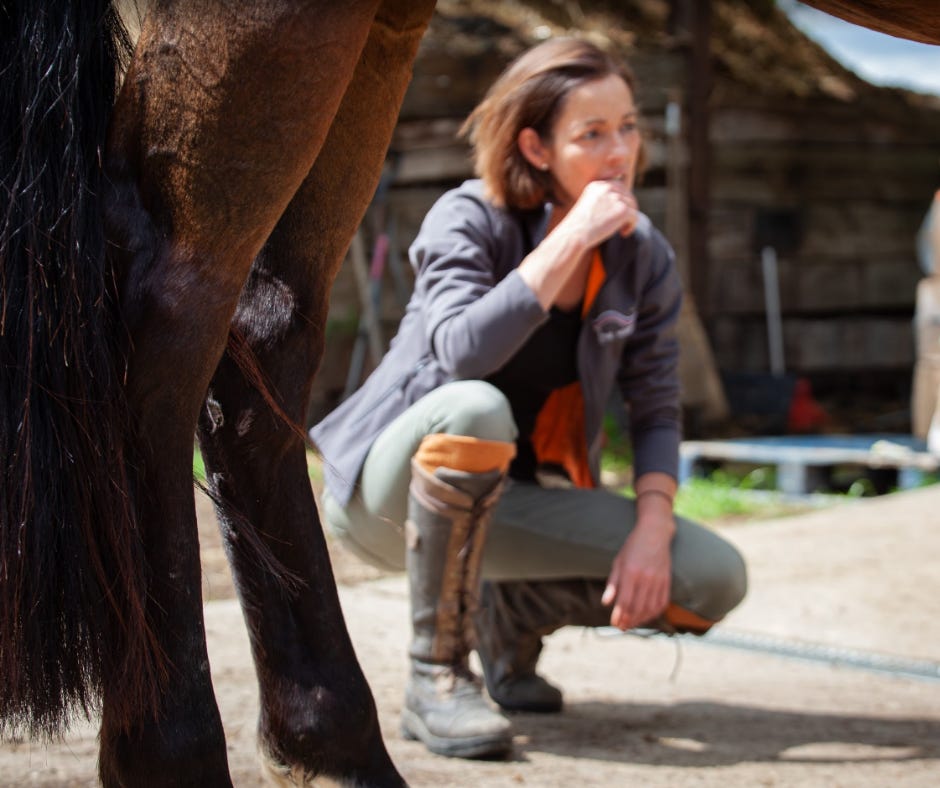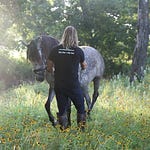In this week's episode, Anna's Louise talks with Allie MacLeod, founder of The Horsebox Spa and registered British Equine Hygienists Association (BEHA) professional; we discovered that proper sheath cleaning is about much more than just basic hygiene; it's a vital part of comprehensive equine healthcare that many owners overlook.
"It's a forgotten organ," Allie explained during the discussion. "Because they're not seeing it, people don't think about it." This blind spot in equine care stems from a combination of embarrassment, lack of education, and outdated beliefs about what domesticated horses need.
The Domestication Dilemma
It's not unusual for owners to wonder why horses need their sheaths cleaned; after all, wild horses don't get them cleaned, a question Allie often gets. But as Allie points out, this comparison misses a crucial difference.
"Wild horses don't get their teeth done. Wild horses don't get their feet trimmed," she told us. "When we domesticate an animal, we are responsible for caring for them. They can't do that themselves as they would in their natural environment."
In the wild, breeding behaviours naturally prevent many hygiene issues. When a stallion covers a mare, the friction helps dislodge smegma build-up before it becomes problematic. Domesticated geldings and non-breeding stallions lack this natural cleaning mechanism, which means without human intervention, problems inevitably develop.
The Hidden Connection to Behaviour
One of the most eye-opening aspects of the conversation with Allie was learning how many behaviour and performance problems actually stem from poor hygiene.
"A lot of the issues you see with horses originate from the sheath," Allie revealed. "It can be tail rubbing. It can be tension around the loins and croup. It can be kicking up at the belly. But nobody ever, ever thinks it's regarding the sheath."
Instead, horse owners often pursue expensive veterinary investigations, chiropractic treatments, or physio when the root cause might be much simpler. Allie described cases where horses were nearly sold due to "behavioural problems" that disappeared completely after a proper hygiene session.
"Sometimes when a horse is really uncomfortable, you can't even put your hand in between the hind legs—they're very touch reactive," she explained. "But after a hygiene, once they're brought back to comfort, you can then touch your horse there."
The Bean Problem
At the heart of many hygiene issues for geldings is something called a "bean", a hardened collection of smegma and debris that forms in a cavity called the urethral fossa.
Allie described it in detail: "There is a cavity within the tip of the penis called the urethral fossa, and smegma gets in there. The hole is quite small, but there is a big cavity behind it. Smegma, dead skin, sweat, grime—it all goes in there, hardens and compacts."
As these beans grow larger, they can press on the urethra, causing pain and potentially leading to urinary tract infections. In severe cases, they can significantly obstruct urination.
"When I first started, I had someone say to me that to be really skilled at bean removal, you're not going to really be skilled until you've done your first 100 horses," Allie shared. "Taking the beans out is alright if they're small, but if you've got a bean that goes almost the width of your palm—some of them have been enormous, they've gone across all four fingers—it takes skill to remove them without harming the horse."
Cancer Risk in Domesticated Horses
Perhaps the most sobering aspect of our conversation was learning about the connection between poor hygiene and cancer risk.
"There has been research into this by a top veterinary surgeon, a Europe-wide renowned equine oncologist," Allie told us. "In the wild or breeding stallions, these cancers are not that common. But unfortunately, it's not uncommon at all in a gelding."
Allie shared with us that during her professional sheath cleaning sessions, she sometimes identifies various abnormalities that warrant veterinary attention.
"I find that roughly one in 10 horses I treat has an abnormality of some description," she explained during our interview. "That doesn't mean it's anything concerning, many abnormalities are benign. But regular sheath cleaning allows us to notice changes early."
What makes this particularly important is that early signs of potential issues can be incredibly subtle, perhaps just a small rough patch of skin smaller than a fingernail. Without regular professional sheath cleaning, these signs are likely to go unnoticed, potentially delaying necessary veterinary care.
The Angus Story: How Sheath Cleaning Changed a Career
The importance of professional sheath cleaning was driven home by the story that led Allie into this profession, a horse named Angus, owned by Annie.
During the first COVID lockdown, Annie asked Allie to check Angus, who had never had a sheath cleaning in the four years she had owned him. Alli discovered significant abnormalities that required veterinary attention.
"I wasn't even able to get my hand into the sheath because he had about four large masses blocking it," Allie recalled. After Alli'es discovery, Annie took Angus to the vet for proper diagnosis and treatment.
This experience changed Allie's career path completely. "If I can play a part in helping identify abnormalities early on, or at the very least, bring a horse back to comfort through proper sheath cleaning, then I would be happy to do this all day long."
What began as a friendly favour became a turning point in Allie's professional life. Her business, The Horsebox Spa, shifted focus, with equine hygiene becoming a core service as she recognized the critical need for qualified professionals in this area.
Don't Forget the Mares
While much of the conversation focused on geldings, Allie stressed that mares need regular hygiene attention too.
"Mares get similar build-up of dead skin and sweat and oil that congeals between their teats," she explained. "That can be almost like it's sharp and as thick as tree bark between their hind legs. You imagine as they're walking along, that's sore for the girls."
Mares can even develop their own version of beans inside the clitoris, causing irritation. "It'd be like having grit in your underpants," Allie pointed out.
She recommends checking mares between the teats but warns that improper technique can cause discomfort. "Be aware that if she has got a crust build-up there, most will cow kick if you touch it. So never just pick it off, you need something to soften it first, like a water-based lube."
Professionalising Equine Hygiene
Recognising the critical importance of this service and the lack of professional standards, Allie helped establish the British Equine Hygienist Association (BEHA) in 2023.
"I felt that the industry was lacking governance, regulation, standards, code of conduct, and training on health checking," she told us. "We set up BEHA with the objective of setting industry standards, a code of practice, ensuring that all our hygienists are fully insured."
The impact has been significant. Insurance companies in London now only insure BEHA-approved hygienists because of the processes they have in place to mitigate risk.
For horse owners looking for a reputable hygienist, Allie recommends going through the BEHA website (beha.org.uk), where they can find trained, insured, and experienced professionals in their area.
One Simple Action: Schedule Professional Sheath Cleaning Annually
When asked what horse owners should do now, Allie's advice was clear: make sheath cleaning part of your regular horse care routine.
"It should always be done by a professional," she emphasised. "For what a sheath clean costs, you will change your horse's world."
Allie recommends annual sheath cleaning for horses from the age of five upwards. Some horses, particularly those prone to excessive smegma production, may benefit from cleaning every six months.
"Don't ignore it because you're embarrassed about it or you don't feel comfortable," Allie urged. "There's nothing to be embarrassed about. There's nothing sexual at all about it. It's just part of the horse."
By bringing proper sheath cleaning into the mainstream conversation about horse care, Allie hopes to change attitudes and improve horse welfare. "We've just got to move on from the grubby connotations, the embarrassment that surrounds the subject," she concluded.
The message is clear: professional sheath cleaning isn't just about cleanliness—it's about comfort, performance, and comprehensive health maintenance for your horse.
To learn more about professional sheath cleaning or to book a session with Allie McLeod (Kent, Sussex and Surrey areas), visit thehorseboxspa.co.uk. For BEHA-registered hygienists in other areas, visit beha.org.uk.
Listen to this episode with a 7-day free trial
Subscribe to Curious Equestrian to listen to this post and get 7 days of free access to the full post archives.











